Books by Quentin Verreycken
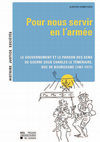
Dans l’imaginaire collectif, la fin du Moyen Âge est souvent réduite à la caricature d’une périod... more Dans l’imaginaire collectif, la fin du Moyen Âge est souvent réduite à la caricature d’une période noire de violences permanentes, dont la guerre était la plus terrible incarnation, et l’homme de guerre, le plus sanguinaire protagoniste. La recherche récente a pourtant démontré l’existence, à l’orée de l’époque moderne, de processus complexes de régulation des comportements et de profondes transformations des structures militaires. Le présent ouvrage propose une étude des différents moyens d’encadrement de la violence des combattants dans les anciens Pays-Bas sous le règne du duc de Bourgogne Charles le Hardi, dit le Téméraire (1467-1477). On observera comment, en temps de guerre, des mécanismes juridiques, politiques et sociaux sont susceptibles de transformer certaines pratiques en crimes, eux-mêmes plus ou moins bien réprimés par la justice. Au travers d’une analyse approfondie de l’usage de la rémission princière, on tentera de souligner l’existence d’un véritable « gouvernement par la grâce » au sein des armées, une forme de pratique de pouvoir qui aurait coïncidé avec la professionnalisation de la guerre, la construction de l’État moderne et l’émergence d’un nouveau statut donné aux combattants.
Papers by Quentin Verreycken
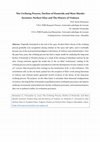
Norbert Elias in Troubled Times, 2021
Originally formulated at the end of the 1930s, Norbert Elias's theory of the civilising process g... more Originally formulated at the end of the 1930s, Norbert Elias's theory of the civilising process gradually won recognition among scholars in the 1970s and 1980s, and it eventually became one of the most praised paradigms in the history of violence and criminal justice. Over the past forty years, the civilising process has been a major model for analysing the long-term decline of homicide in Western Europe as a result of the taming of individual violence by the state. Facing criticisms against his model due to the so-called 'evolutionary' reading of the civilising process and its supposed contradictions with the development of mass violence in the 20 th century, Elias focused his later writings on the mechanisms of de-or dys-civilisation. This contribution will, on the one hand, analyse how the reception of Elias's work among historians of violence and criminal justice generated several revisions of the theory of the long-term civilising process. We propose, on the other hand, to articulate three historical configurations of violence: the long decline of homicide in pacified societies (civilisation processes), the massive outbursts of extremely violent behaviour (de/dys-civilisation processes), and transitional justice after war or political conflict (re-civilisation processes).
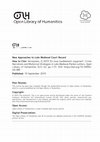
Open Library of Humanities, 2019
The charters of pardon or ‘remission letters’ granted by the king of France and the duke of Burgu... more The charters of pardon or ‘remission letters’ granted by the king of France and the duke of Burgundy in the late Middle Ages have often been interpreted as a valuable source material to access to the lives, memories, and even the ‘voices’ of the ordinary people who did not produce any other writing. The preamble of each letter was indeed a copy of the supplication submitted by the future pardon beneficiary, in which he narrated his crime and begged for the sovereign’s mercy. However, as with many other documents preserved in court and chancery records, remission letters engage historians with a series of methodological questions due to the nature of the documents and the context in which they were produced. Because they hoped to be granted the monarch’s mercy, petitioners used a series of legal and rhetorical techniques to describe themselves and elaborate their narrations, following the advice of the clerks and lawyers who helped them to compose their petitions. This article explores some of these strategies used by French and Burgundian pardon beneficiaries and compares them to those found in English petitions for pardon. It argues that rather than being considered as an obstacle to accessing to the truth behind the sources, these strategies should be analysed as the testimony of the legal and administrative practices of the time.
Paul Delsalle, Gilles Docquier, Alain Marchandisse et Bertrand Schnerb (eds.), Pour la singuliere affection qu’avons a luy. Études bourguignonnes offertes à Jean-Marie Cauchies, Turnhout, Brepols, 2017, p. 515-522, 2017
Laurent Jalabert, Stéfano Simiz (eds.), Le soldat face au clerc. Armée et religion en Europe occidentale, XVe-XIXe siècle, Rennes: Presses universitaires de Rennes, 2016, p. 163-178.
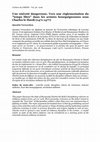
C@hiers du CRHIDI, Mar 2016
Cet article traite des réformes disciplinaires du duc de Bourgogne Charles le Hardi en matière mi... more Cet article traite des réformes disciplinaires du duc de Bourgogne Charles le Hardi en matière militaire entre 1471 et 1476. Plus spécifiquement, on analysera la tentative du duc de réglementer le « temps libre » des soldats bourguignons lorsqu’ils n’étaient pas en train de manœuvrer ou de combattre sur le champ de bataille. Le principal argument défendu ici est qu’en interdisant certaines activité de divertissement, tels les jeux de dé ou les beuveries, et en instituant des entraînements collectifs aléatoires afin de prévenir la désertion et insuffler un esprit de loyauté parmi les gens de guerre, Charles tenta de diffuser un nouveau modèle de discipline militaire dans ses armées ; un modèle qui, en dépit des échecs du duc, peut être considéré comme l’un des points d’origine de la révolution militaire du XVIe siècle.
This paper discusses the duke of Burgundy Charles the Bold’s disciplinary reforms on military matters from 1471 to 1476. More precisely, it focuses on the duke’s intent to regulate the “free time” of Burgundian soldiers when they were not maneuvering or fighting at battle. The main argument formulated here is that by prohibiting several spare-time activities such as dice games or binge drinking and by instituting random collective training in order to prevent desertion and inspire loyalty to men of war, Charles tried to spread a new model of military discipline in his armies ; a model which, in spite of the duke’s failures, can be considered as a starting point of the sixteenth-century military revolution.
Urbanités, n° 5 : Villes et châtiments, May 2015
Call for papers by Quentin Verreycken
Conferences, panels, and sessions organised by Quentin Verreycken
Bibliothèque nationale de France, ms. fr. 5054, fol. 24v.
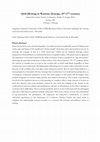
Panel abstract: Since the last forty years, the historiography of warfare has been considerably r... more Panel abstract: Since the last forty years, the historiography of warfare has been considerably renewed. Being aware of the gaps and biases of the traditional " histoire-bataille " , historians and social scientists now try to envisage the concept of war as a " total social fact " which can be analyzed through various perspectives from political or constitutional history to gender studies. This panel seeks to approach the experience of war and warfare by the study of written sources considered as " ego-documents " delivering the personal testimonies of their authors. The selected period (15 th-17 th century) allows the authors to consider war as a part of the everyday life to which individuals (regardless of their social levels) were confronted. The Burgundian/Habsburg Low Countries offer a rich field of study because of the conflicts that took place there during the period. But far from being limited to a local perspective, this panel will also envisage these testimonies in an international perspective, as a European, connected experience of war. The three papers of this panel will investigate three classical categories of sources: legal, judicial, and narrative documents. The system of petitioning involved in the legislative process or the granting of a pardon offers a large amount of stories on both the logistical and social problems carried by war, from the funding of the armies to the confrontation between soldiers and populations, and give us information on the State's attempt to overcome these difficulties. These concrete problems deserve to be confronted with the ideological discourses elaborated in political writings and poetry. With these various sources here interpreted as ego-documents, the participants will emphasize the important contributions of various individual experiences to the elaboration of a collective identity. Finally, this panel tends to enlighten the relationships between wartime as a concrete life moment and different forms of writing.
Book Reviews by Quentin Verreycken
Book review of Peter Arnade, Walter Prevenier, "Honor, vengeance, and social trouble. Pardon lett... more Book review of Peter Arnade, Walter Prevenier, "Honor, vengeance, and social trouble. Pardon letters in the Burgundian Low Countries", Ithaca, Cornell University Press, 2015.
Gérer les conflits dans l’espace urbain, 18e-21e siècles [Book review of Pierre Bergel and Vincent Milliot (eds), "La ville en ébullition. Sociétés urbaines à l’épreuve"]
Espacetemps.net, Aug 25, 2015
Lectures (online), Jul 3, 2015
Lectures (online), May 4, 2015











Uploads
Books by Quentin Verreycken
Papers by Quentin Verreycken
This paper discusses the duke of Burgundy Charles the Bold’s disciplinary reforms on military matters from 1471 to 1476. More precisely, it focuses on the duke’s intent to regulate the “free time” of Burgundian soldiers when they were not maneuvering or fighting at battle. The main argument formulated here is that by prohibiting several spare-time activities such as dice games or binge drinking and by instituting random collective training in order to prevent desertion and inspire loyalty to men of war, Charles tried to spread a new model of military discipline in his armies ; a model which, in spite of the duke’s failures, can be considered as a starting point of the sixteenth-century military revolution.
Call for papers by Quentin Verreycken
Conferences, panels, and sessions organised by Quentin Verreycken
Book Reviews by Quentin Verreycken
This paper discusses the duke of Burgundy Charles the Bold’s disciplinary reforms on military matters from 1471 to 1476. More precisely, it focuses on the duke’s intent to regulate the “free time” of Burgundian soldiers when they were not maneuvering or fighting at battle. The main argument formulated here is that by prohibiting several spare-time activities such as dice games or binge drinking and by instituting random collective training in order to prevent desertion and inspire loyalty to men of war, Charles tried to spread a new model of military discipline in his armies ; a model which, in spite of the duke’s failures, can be considered as a starting point of the sixteenth-century military revolution.
Starting with the example of the collective pardon granted to the rebel city of Ghent in 1453, followed five years later by a Joyous Entry, I will describe the legal and ideological framework of the medieval princely pardons. I will first argue that the concepts of mercy and clemency, which were used in texts to characterize the duke’s sense of forgiveness, originated from the late Antiquity. Clemency was theorized by the Stoic philosopher Seneca the Younger in his De Clementia. It became one of the main principles of the good princely government based purely on reason. Mercy, on the contrary, was more a Christian concept developed by the Father of Church as a form of empathy in administrating justice, based on the imitation of divine justice. During the medieval period, the principles of mercy and clemency became the two major frameworks of the ideology of royal and princely forgiveness and, as a results, the terms were used in both narrative and judicial sources. From the twelfth century onwards, medieval rulers like the king of England or France started to issue pardon letters in which mercy was invoked to justify the grant of the pardon. Considering this, I will present the pardon letters delivered in the fifteenth-century Low Countries by the dukes of Burgundy: remission letters, letters of banishment reversal, and abolition letters.
In the second part of this talk, I will discuss collective pardons granted to cities in the context of a Theatre State. After having insisted on the role of public ceremonies in the process of reconciliation between the rebels and the prince, I will examine the content of these collective pardons. I will briefly show how these pardons were built and how the content and vocabulary of the text mirrored the public ceremonies as a staging of the submission of the rebels to the ducal authority. I will also have some archival considerations about the fact that these collective pardons were rarely registered in the pardon records – the “audience registers” of the Chamber of Accounts of Lille – because most of the time they were included in political treatises which ended rebellions.
Finally, on the third part of this discussion, I will examine individual pardons granted to criminals. My purpose here will be to show that even though the delivery of these pardons was far less spectacular than collective pardons granted to cities, the efficiency and political meaning of these pardons were not automatically minor. Individual pardons were a means of government of the dukes’ subjects, as I will demonstrate with five short arguments. First, some individual pardons were explicitly granted for political reasons, mainly because the pardon beneficiary was a nobleman who had a large political networks and obtained the support of a powerful lord or a member of the prince’s court. Second, looking at the geographical repartition of individual pardons shows that some territories (like the county of Flanders) were more privileged than others. Third, the language used in the remission letter itself had a political meaning. Indeed, while all over the fifteenth century the majority of pardons were granted to criminals from the county of Flanders, it is only in 1477 that the dukes of Burgundy started to issue remission letters in Flemish. Fourth, the list of crimes usually pardoned in remission letters was in fact limited and reflected the dukes’ views on good behaviors and justice. Five, looking at the professions of the pardon beneficiaries could reveal a specific ducal policy, at it is shown by remission letters granted to soldiers, which were used in wartime as an instrument of social disciplining in the armies.
In conclusion, with this talk I will try to show that the princely “staging of mercy” had a long history and implied public ceremonies as well as legal documents using a specific vocabulary, issued with a certain intention.
Là où Norbert Élias voyait dans la civilisation des mœurs l’imitation du modèle d’autocontrôle de la noblesse par le reste de la population, l’historien Gerhard Oestreich insista plutôt sur les politiques de « disciplinarisation sociale » menées par l’État. Or, si nous suivons les travaux de Michel Foucault, l’armée a toujours constitué le « laboratoire disciplinaire » de l’État, le terrain d’expérimentation du biopouvoir. Dans cette perspective, avant d’étendre la taille de ses forces armées, l’autorité centrale ne doit-elle pas d’abord en avoir un meilleur contrôle ?
L’objectif de la présente contribution est de formuler l’hypothèse de l’invention, dès la fin du XVe siècle, d’une forme nouvelle de discipline des soldats, différente du modèle traditionnel de la chevalerie, qui aurait accompagné la construction de l’État tout en précédant la révolution militaire. Pour ce faire, nous nous focaliserons sur le cas des armées du duc de Bourgogne Charles le Hardi, dit le Téméraire. En dix années de règne, ce prince réorganisa en profondeur ses institutions militaires, se dotant de troupes permanentes, réformant la justice, pour finalement tenter d’imposer un nouveau modèle de comportement basé sur le service loyal au souverain et à l’État lui-même. Pour évaluer les moyens et les circonstances de production de cette norme, nous mobiliserons à la fois des sources de la théorie et de la pratique, en basant notre recherche sur la législation militaire du duc et sur les nombreuses lettres de rémission accordées par ce dernier à ses soldats. Nous soulignerons comment, en réglementant pour la première fois en Europe du Nord un système d’entraînement des troupes sensé renforcer la loyauté au souverain, en valorisant le service militaire comme motif de pardon, tout en multipliant les ordonnances condamnant les crimes associés à la guerre (viol, pillage, etc.), Charles le Hardi tenta de créer une discipline et une identité militaire commune à l’ensemble de ses soldats, tentative certes interrompue par les défaites cuisantes et la disparition du duc, avant de se concrétiser durant les siècles suivants.
ParenThèses. Carnet d’histoire du droit et des institutions is the doctoral research blog of two Belgian PhD students in History, a medievalist and a modernist, who share the same interest for Legal and Institutional History.
de concilier travail et sédentarité forcée au domicile nous ont contraint·es à inventer de nouvelles stratégies, pour la démarche heuristique, la rédaction et la communication. Physiquement et psychologiquement, cet effort a eu un coût, parfois considérable, nous n’en sortons pas toujours indemnes, on ne peut ni l’ignorer ni le passer sous silence ; nous avons fait front, chacun·e comme nous le pouvions, à des situations diverses et parfois extrêmement difficiles ne laissant guère d’espace, de temps et d’énergie pour la recherche.
Quel est le bilan d’une seconde année peut-être plus perturbée encore, et perturbante, que la précédente, qui s’était déroulée normalement du moins jusqu’à la mi-mars ? Chacun aura sa réponse en fonction de son vécu et de sa capacité à réagir, à s’adapter, à trouver la force de ne pas céder au découragement. En ce qui me concerne, le confinement de cette année a été, pour mes activités de chercheur, dramatique sans
être tragique : arrêt de la recherche de terrain depuis plus d’un an, moyens financiers perdus, colloques ratés, articles non publiés. À côté de ces frustrations et privations, j’ai eu, comme président de notre institut, certes des problèmes multiples et variés à assumer, mais j’ai pu aussi côtoyer, en tout cas virtuellement, des collègues qui, malgré tout, ont réussi à persévérer dans leurs travaux, en gardant le cap en termes de qualité mais aussi de quantité.
La Newsletter de juin 2021 reflète bien cet attachement à la recherche qui, associée à l’enseignement, constitue l’identité spécifique de l’université. Voilà du moins qui est de bon augure pour la rentrée 2021-2022, même si, nous en sommes conscient·es, subsistent encore des inconnues quant au retour tant espéré à la normalité avec des auditoires
occupés à pleine capacité et des bibliothèques accessibles sans restriction, et surtout des contacts et échanges liés à la vie universitaire dont nous avons été, comme nos étudiant·es, si cruellement privé·es.